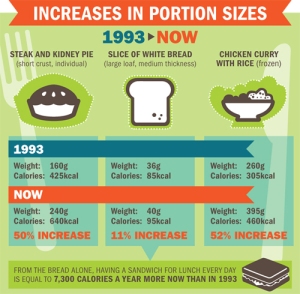Some of the news headlines today about a new piece of research (which is in fact a round up of 61 previous studies) are,
~ Portion size key in tackling obesity, says study
~ Growing portion sizes a major factor in rising UK obesity, study finds
~ End to supersizing could reverse obesity trend
~ Want To Lose Weight? Buy Smaller Plates!
The Cambridge University led team of researchers says that by simply replacing large sizes of foods and drinks with standard amounts, British consumers could reduce overall calorie intake by up to 16 per cent. Over a year, that could result in weight loss of around two stone. If American adults did the same, they could reduce their intake by 22%-29%.
One of the ways of achieving this, the authors say, is by shifting away from a culture of large dinner plates, wine glasses and “supersize” portions. They found that people offered portions of food or crockery in larger sizes “consistently” consumed more of what they were given.
Add to this the well-documented evidence that portion sizes of packaged foods have increased substantially, and you have a recipe for trouble. My blog post The Side Plate Diet: Portion Distortion from earlier this year cites a number of pieces of research on the subject.
Of today’s news, Dr Alison Tedstone, the chief nutritionist at Public Health England, said: “This study clearly demonstrates that reducing portion sizes is a successful way to cut calories. Given that almost two-thirds of adults are overweight or obese, it’s important to keep an eye on portion sizes when cooking, shopping and eating out to avoid overeating and help maintain a healthy weight.” You can find the full research on the Cochrane Library webiste.
Well you could always try my simple solution, which is to eat all your meals off a side plate. How small will it need to be? Have a read of my Side Plate blog post.
It has worked for me ~ I am a very healthy weight and I am eating perfectly normal, healthy food; in addition, I am avoiding adding a layer of what I regard as complication, such as calorie counting, fasting, or the cutting out of one food group (for example carbs).
Give it a go. I can highly recommend it. And please share the buzz!
Annie Bee x









